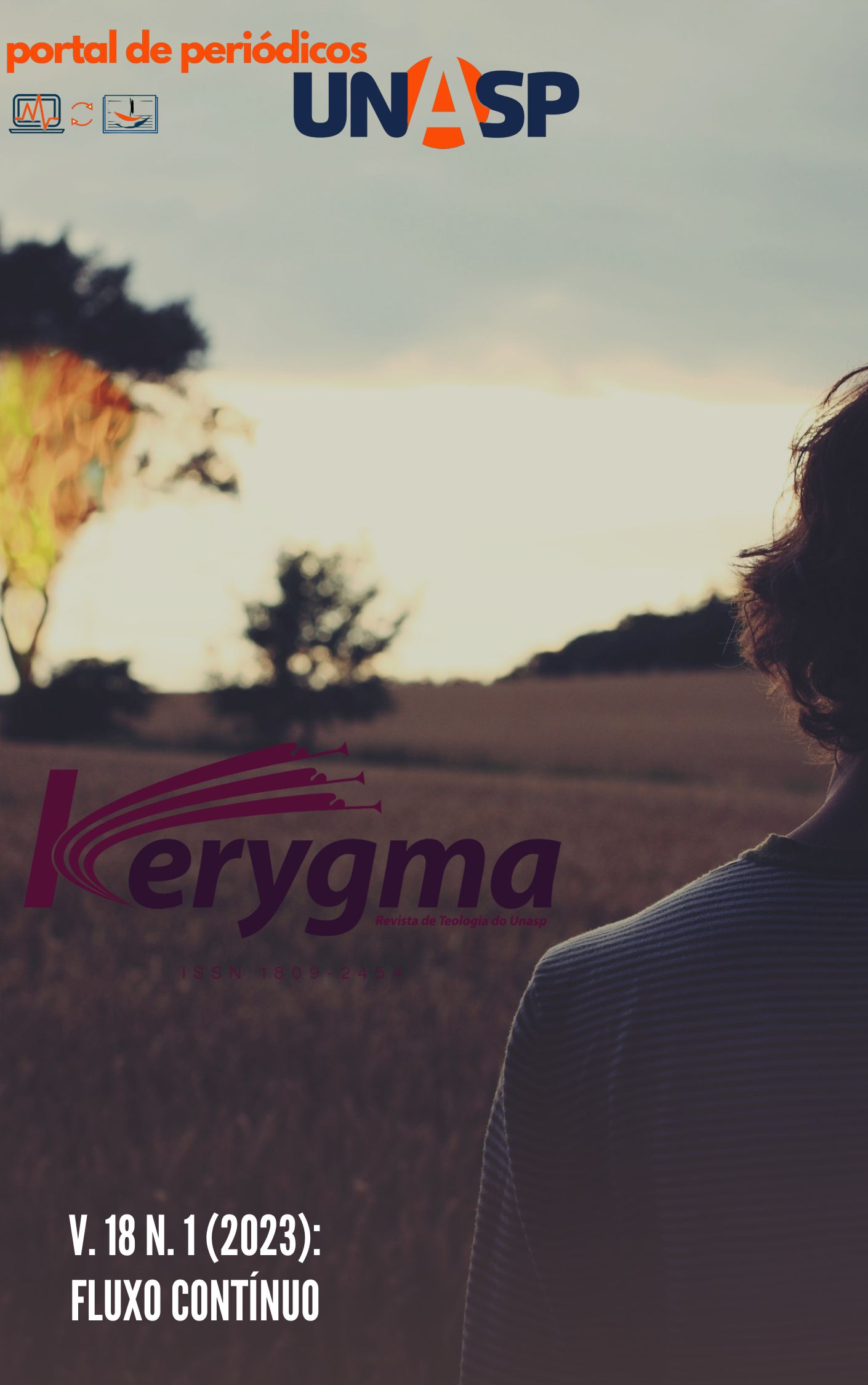Dissidência e apostasia aspectos éticos do relato de Juízes 17 e 18
DOI:
https://doi.org/10.19141/1809-2454.kerygma.v18.n1.pe1420Palavras-chave:
Adoração, Apostasia, DissidênciaResumo
A apostasia entre os cristãos tem sido uma preocupação desde os tempos antigos e continua a ser uma questão relevante hoje. Os relatos bíblicos ilustram numerosos casos em que Deus se posiciona contra a dissidência e o estabelecimento de ministérios paralelos que desencaminham as pessoas na falsa adoração. Este estudo visa demonstrar, a partir do exemplo de Mica, os perigos da dissidência e da prática de ministérios paralelos em relação à obra de Deus. Enfatiza que a adoração a Deus deve estar alinhada com seus propósitos, em vez de ser baseada em interpretações pessoais. O livro de Juízes apresenta narrativas de libertação, mas também destaca o caos espiritual que surgiu entre o povo de Deus, principalmente devido à idolatria e à apostasia. As consequências do sincretismo afetaram os aspectos sociais, políticos e religiosos da vida dos israelitas como resultado da sua desobediência aos mandamentos de Deus. O exemplo bíblico mostra claramente que a falsa adoração desafia diretamente o Criador, levando à apostasia e à dissidência dentro da comunidade dos crentes.
Downloads
Referências
ARCHER. Gleason. Merece confiança o Antigo Testamento? 3. ed. São Paulo: Vida Nova, 1984.
BEALE, Gregory. Você se torna aquilo que adora: uma teologia bíblica da idolatria. São Paulo: Vida Nova, 2014.
SOCIEDADE BÍBLICA DO BRASIL. Bíblia de estudo plenitude: o livro de Juízes. São Paulo: Sociedade Bíblica do Brasil, 2010.
CHAMPLIN, Russell. O antigo testamento interpretado versículo por versículo. São Paulo: Hagnos, 2000. v. 2.
DORNELES, Vanderlei (ed.). Comentário bíblico adventista do sétimo dia: Josué a 2 Reis. Tatuí: Casa Publicadora Brasileira, 2012. v. 2.
BEZERRA, Joede (ed.). Comentário bíblico beacon: Josué a Ester. Rio de Janeiro: Casa Publicadora das Assembleias de Deus, 2009. v. 2.
PFEIFFER, Charles; Harrison, Everett (orgs.). Comentário bíblico Moody: Josué a Cantares. São Paulo: Batisa Regular, 1991. v. 2.
CUNDALL, Artur; MORRIS, L. Juízes e Rute: introdução e comentário. Tradução de Oswaldo Ramos. São Paulo: Vida Nova, 1986. (Série cultura bíblica).
DAVIS, John. Dicionário da Bíblia. 7. ed. Rio de Janeiro: Juerp, 1980.
DIVISÃO NORTE-AMERICANA DA IGREJA ADVENTISTA DO SÉTIMO DIA. Uma avaliação da atitude de alguns ministérios independentes contra a igreja. In: A natureza de Cristo. Parousia, ano 7, n. 1, p. 75-89, 1º semestre 2008. Disponível em: https://cdn.centrowhite.org.br/home/uploads/2023/02/Parousia-_A-Natureza-de-Cristo_-1o-sem-2008.pdf. Acesso em: 08 out. 2024.
ELLISEN, Stanley. Conheça melhor o antigo testamento: um guia com esboços e gráficos explicativos dos primeiros 39 livros da Bíblia. 2. ed. São Paulo: Vida, 2007.
GANE, Roy. Héroes imperfectos de Dios. Buenos Aires: Asociación Casa Editora Sudamericana, 1996.
GERSTENBERGER, Erhard. Teologias no Antigo Testamento: pluralidade e sincretismo da fé em Deus no Antigo Testamento. São Leopoldo: Sinodal, 2007.
GIBERT, Pierre. Como a Bíblia foi escrita: introdução ao antigo e ao novo testamento. 2. ed. São Paulo: Paulinas, 1999.
SOCIEDADE BIBLICA DO BRASI (org.). Manual Bíblico SBB. 2.ed. revisada. São Paulo: Sociedade Bíblica do Brasil, 2010.
RÖSEL, Martin. Panorama do antigo testamento: história, contexto e teologia. São Leopoldo: Sinodal, 2009.
SCHMIDT, Werner. Introdução ao Antigo Testamento. 4. ed. São Leopoldo: Sinodal, 1994.
SELLIN, Ernst.; FOHRER, Georg. Introdução ao antigo testamento. São Paulo: Paulinas, 1977. v. 1.
WHITE, Ellen. Testemunhos para ministros. 4. ed. Tatuí: Casa Publicadora Brasileira, 2008.
WHITE, Ellen. Mensagens escolhidas. Tatuí: Casa Publicadora Brasileira, 2000. v. 2.
WHITE, Ellen. O lar adventista. 14. ed. Tatuí: Casa Publicadora Brasileira, 2004.
WHITE, Ellen. Patriarcas e profetas. 16. ed. Tatuí: Casa Publicadora Brasileira, 2006.
XAVIER, Érico. A noiva estava linda: esperança para os desapontados com a igreja. Revista Adventista, ano 105, n. 1221, p. 12-13, fev. 2010. Disponível em: https://acervo.cpb.com.br/ra. Acesso em: 08 out. 2024.
XAVIER, Érico. Aspectos éticos do relato de Juízes 17. In: II SIMPÓSIO DA SOCIEDADE TEOLÓGICA ADVENTISTA. 2., 2013, Cachoeira. Doutrina de Deus: Ortodoxia e Dissidência. Cachoeira, BA: Seminário Adventista Latino-Americano de Teologia – Sede IAENE, 2013.
WIERSBE, Warren W. Comentário Bíblico Expositivo. Santo André: Geográfica, 2017. v. 2.
Downloads
Publicado
Como Citar
Edição
Seção
Licença
Copyright (c) 2023 Kerygma

Este trabalho está licenciado sob uma licença Creative Commons Attribution 4.0 International License.
Declaração de direitos autorais
Em síntese, autores que publicam na Kerygma devem concordar que:
-
Após a aceitação, os direitos autorais dos artigos são transferidos à Kerygma.
-
Todo material de terceiros utilizado no texto deve estar corretamente referenciado.
-
Os autores devem possuir autorização para uso de imagens, tabelas e demais materiais gráficos.
-
Os autores asseguram que o texto é original, de sua autoria, e não foi submetido ou publicado em outro veículo.
-
As ideias e opiniões expressas são de responsabilidade exclusiva dos autores, não refletindo necessariamente a posição da revista.
-
Os editores reservam-se o direito de realizar ajustes textuais e adequações às normas editoriais.
-
Os autores mantêm os direitos autorais e concedem à revista o direito de primeira publicação, sob licença Creative Commons Atribuição–Não Comercial 4.0 Internacional.
-
Os autores autorizam a reprodução e adaptação do material pela Kerygma, mediante participação ou autorização expressa quando necessário.
-
A revista poderá distribuir, armazenar, arquivar e disponibilizar os artigos por quaisquer meios físicos ou digitais, gratuitos ou pagos.
-
Os autores podem firmar contratos adicionais para distribuição não exclusiva do trabalho, com menção à publicação original na Kerygma.
-
A reprodução integral ou parcial dos textos em outros meios requer autorização prévia e escrita do editor.
-
Os autores são autorizados e incentivados a divulgar seus trabalhos online antes ou durante o processo editorial, visando ampliar seu impacto acadêmico.














